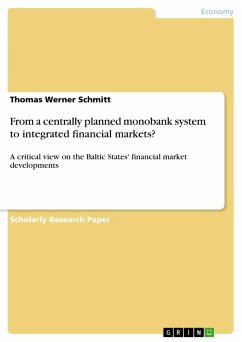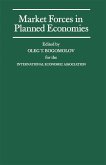Research Paper (undergraduate) from the year 2008 in the subject Economics - Monetary theory and policy, grade: 1,0, University of Applied Sciences Kaiserslautern (Betriebswirtschaft - Studiengang: Finanzdienstleistung), language: English, abstract: More than three years went past since the European Union has increased by eight new member states from Central and Eastern Europe. Among them, especially the Baltic States have reached recently high economic growth rates. In particular Latvia, which recorded the highest one (11.9% in 2006) in the whole European Union. Having regained their independence in 1991, after the breakdown of the Soviet Union, the three Baltic States might have developed after a more than 10- year continuing transformation- process of their economies, through self- confident countries with interesting investment opportunities for foreign investors. Since the independence of the three Baltic States was restored, all three countries were driven to replace the centrally planned, socialist system, forced by the Soviet Union through a structure based system on free market principles. A continuing order of political and economical events during the last two decades, and the contemporaneous developments in the financial markets, as well as the banking and insurance sector of the three Baltic states, upcoming changes in the course of onward globalisation, and the broadening unification in financial market regulation led to serious changes and demonstrated important milestones to liberalised market principles. The descriptive literature, which supported the present minithesis, describes only short periods of the developments in the Baltic financial markets. Moreover, you will not find a kind of evaluation about all three Baltic States in comparison to each other over such a long time period. There are no current statements, which conclude this whole development- period among the three Baltic states and there is no clear assessment whether the Baltic states` financial markets can be considered as integrated or not. Therefore, this minithesis serves as an attempt to answer this main question.
Hinweis: Dieser Artikel kann nur an eine deutsche Lieferadresse ausgeliefert werden.
Hinweis: Dieser Artikel kann nur an eine deutsche Lieferadresse ausgeliefert werden.








